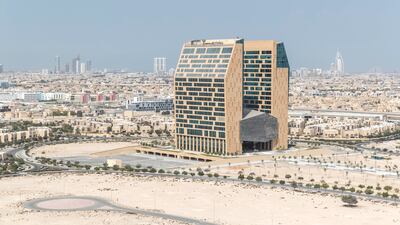Ambition has been a defining feature of the UAE since 1971, and every initiative launched since has embodied this virtue in full. The UAE Net Zero by 2050 strategy, a national drive to achieve net-zero emissions by 2050, is the latest case in point of our penchant to achieve the seemingly impossible.
Addressing climate change is of collective consequence – aside from irreversibly harming the planet, its impact on global wealth is predicted to be beyond significant.
We can expect as much as $23 trillion in reduced annual global economic output worldwide as diseases spread, rising sea levels consume urban centres and crop yields fall, according to Swiss Re, one of the world’s largest providers of insurance.
The UAE Net Zero Strategic Initiative lays the road map to a more hopeful future and, simultaneously, sustainable developments to protect the national economy. It further enhances the country’s standing as an attractive destination for investment and, ultimately, an ideal, future-ready place to live.
At Dubai Science Park, a science-focused business district, home to more than 400 companies covering sciences, energy and environmental sectors, we are already seeing a number of our business partners adopting environmentally friendly practices and integrating sustainability into their core strategy.
Urban development
Handasiyah is a leading engineering distributor that provides clean energy solutions to reduce electricity and water consumption.
It provides products like cooling towers and water filtration systems to major projects such as the Mohammed bin Rashid Al Maktoum Solar Park, Green Planet in City Walk and Sheikh Zayed Grand Mosque. The company is expanding its product portfolio in power, renewable and sustainable energy and building solutions, making it easier for a country renowned for outstanding real estate developments to ensure greener practices.
International heavyweight EP&T Global harnesses the power of advanced data technology to help businesses reduce energy consumption and carbon emissions in built environments. For more than 25 years, the international brand has established itself as a leader in the field, pioneering and enhancing technology that identifies opportunities to reduce energy consumption, collects invaluable data to enhance environmental performance.
According to EP&T, buildings use more than one-third of the world’s energy and water and emit over a quarter of carbon dioxide. Their innovation-driven solutions enable businesses across the region to make smarter decisions in how their buildings operate, an asset to Dubai’s ever-expanding urban plan.
Waste management
Ehfaaz is a high-tech start-up that transforms food and fast-moving consumer goods waste into organic fertilisers and cleaning products. They are a fast-growing company working with major corporations the likes of PepsiCo in diverting waste from landfills.
Of particular value to our own science community, Ehfaaz provides pharmaceutical suppliers, manufacturers and logistics centres with services to destroy expired or unsellable products safely and securely. Items like plastic bottles and chip bags, which cannot be turned into compost nor efficiently destroyed, are upcycled to create consumer products like shoes and bags.
Upcycled products
Established in 2014, Avani is spearheading the move from petroleum-based plastic to bio-based solutions for food packaging and hospitality products.
With more than 20,000 restaurants in Dubai alone, this initiative can tremendously balance the residual impact of plastic on the local environment. At Avani, technology transforms plant-sourced renewable resources into biodegradable and compostable items, such as takeaway cups and boxes, wooden cutlery, and shopping and laundry bags used daily.
Similarly, DSP-based start-up DGrade recycles plastic water bottles into a high-quality yarn called Greenspun. The upcycled yarn can produce more than 200 types of fabric using 50 per cent less energy, 20 per cent less water, emitting 55 per cent less carbon, opening new doors for the fast fashion industry, notorious for its ecologically damaging practices and resource consumption.
The road ahead
This is but the tip of the iceberg of remarkable businesses spearheading the UAE’s efforts to achieve net-zero emissions and counter the looming impact of climate change across a range of industries.
Along with their outstanding efforts and tech-driven solutions, it is up to us collectively to ensure that our fervour to adopt sustainable practices, businesses and lifestyles remains vigorous.
Business districts and free zones can promote the growth of environmentally conscious companies by offering business-friendly policies and support to boost success. They effectively attract talent, innovative businesses and inward investment, paving the way for an even more competitive economy and in turn, boosting economic growth at large.
Our vision is to continue helping businesses grow and achieve real, actionable change by investing in best infrastructure, delivering enabling policies and organising opportunities for our business partners to converge.
Marwan Abdulaziz Janahi is the Managing Director of Dubai Science Park (DSP)

